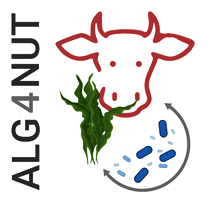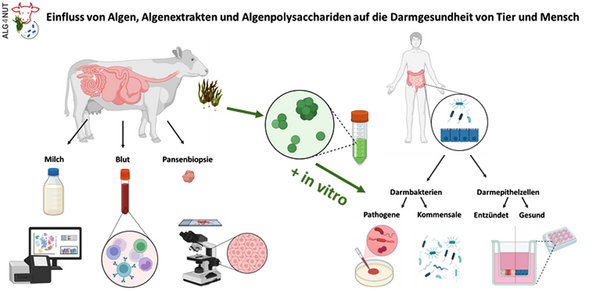AG Breitrück
Contact
Dr. rer. nat. Anne Breitrück
Main Topics
Intestinal dysbiosis (or microbial imbalance) in different diseases
The intestinal microbiota is a complex ecosystem consisting of over a thousand bacterial species reaching its highest concentration in the colon. In adults, a healthy intestinal microbiota is dominated by the phyla Bacteriodetes and Firmicutes and shows a high diversity and richness. Additional members represented in the gut include species from the phyla Actinobacteria and Proteobacteria. These so-called “commensals” are essential for the host metabolism, nutrition function, maturation of the immune system and protection against pathogens. During human lifetime, different factors, such as mode of delivery, diet, geography, antibiotic use and the development of gastrointestinal diseases can influence the composition of the intestinal microbiota. A disruption of this ecosystem, a so-called intestinal dysbiosis favors the development and/or is accompanied by intestinal diseases like Inflammatory Bowel Disease (IBD) or Clostridium Difficile Infection (CDI). Even in non-intestinal diseases like Chronic Kidney Disease (CKD) an intestinal dysbiosis could be observed.
Our research is focused on the composition of the intestinal microbiota in different diseases and how these changes correlate with the disease status.
In this project we are collaborating with Dr. Sebastian Koball (Department of Nephrologie), Dr. Holger Schäffler (Department of Gastroenterology), Prof. Steffen Mitzner (Fraunhofer Unit EXIM).
Development of a functionalized Design Microbiome (supported by DAMP foundation)
Crohn’s disease (CD) and ulcerative colitis (UC), collectively termed inflammatory bowel diseases (IBD), represent chronic relapsing and remitting disorders of the gastrointestinal tract. IBD is a complex disease and although the etiology is not fully understood there is substantial evidence that overreacting immune responses to intestinal microbiota in genetically predisposed individuals is substantially involved in IBD pathogenesis. The composition of the microbiota in IBD patients differs significantly from healthy individuals. The overall bacterial diversity is decreased. Moreover, bacteria from the Proteobacteria phylum are increased, and those from the Firmicutes phylum are decreased. Since the intestinal dysbiosis contributes substantially to the aetiology and pathogenesis of IBD, the modification of the intestinal microbiome represents a promising therapy option.
Our research is focused on the development of a functionalized design microbiome that targets the dysbiosis and inflammatory processes. The therapeutic potential will be investigated in appropriate cell culture models and in an experimental colitis model. These findings will help to pave the way for clinical trials in IBD patients.
In this project we are collaborating with Prof. Steffen Mitzner (Fraunhofer Unit EXIM) and industry partner.
Projects
Alg4Nut

Alg4Nut
Algen in der Wiederkäuerfütterung
Mikrobiologisch-funktionelle Grundlagen,
präbiotische Effekte und Machbarkeit des Algenanbaus in MV
Projektbeschreibung
Im Rahmen der Initiative zur angewandten Exzellenzforschung in Mecklenburg-Vorpommern erforschen wir mit 8 PartnerInnen aus 5 Institutionen im Verbundprojekt "Alg4Nut" den Einfluss von im Ostseeraum kultivierbaren Meeresalgen auf die Tierernährung.
In der Abteilung Medizinische Mikrobiologie an der Universitätsmedizin Rostock befassen wir uns im Rahmen eines Teilprojektes mit dem Einfluss von Algen, Algenextrakten und Algenpolysacchariden auf die Darmgesundheit von Tier und Mensch.
Projektleitung
Projektmitarbeiterinnen
Laufzeit
01.04.2025 – 31.03.2029
Projektpartner
| Prof. Dr. Mirko Basen | Universität Rostock Abteilung Mikrobiologie |
| Prof. Dr. Thomas Schweder | Universität Greifswald Pharmazeutische Biotechnologie |
| PD. Dr. Björn Kuhla | Forschungsinstitut für Nutztierbiologie Ernährungsbiochemie Dummerstorf |
| Prof. Dr. Lisa Bachmann | Hochschule Neubrandenburg FB Agarwirtschaft und Lebensmittelwissenschaften |
| Prof. Dr. Tim Urich | Universität Greifswald AG Bakterienphysiologie |
| Prof. Dr. Dörte Becher | Universität Greifswald AG Mikrobielle Proteomik |
| Prof. Dr. Klaus Herburger | Universität Rostock AG Zellbiologie phototropher mariner Organismen |
| PD Dr. Katharina Hoff | Universität Greifswald Institut für Mathematik und Bioinformatik |
Gefördert von

Group
Goup leader
Technical assistant

Jana Bull
- Medizinisch-technische Assistentin in der Forschung
am Institut für Medizinische Mikrobiologie, Virologie und Hygiene
+49 (0) 381 494 5957
+49 (0) 381 494 5794
+49 (0) 381 494 5799
+49 (0) 381 494 5902
jana.normann{bei}med.uni-rostock.de

